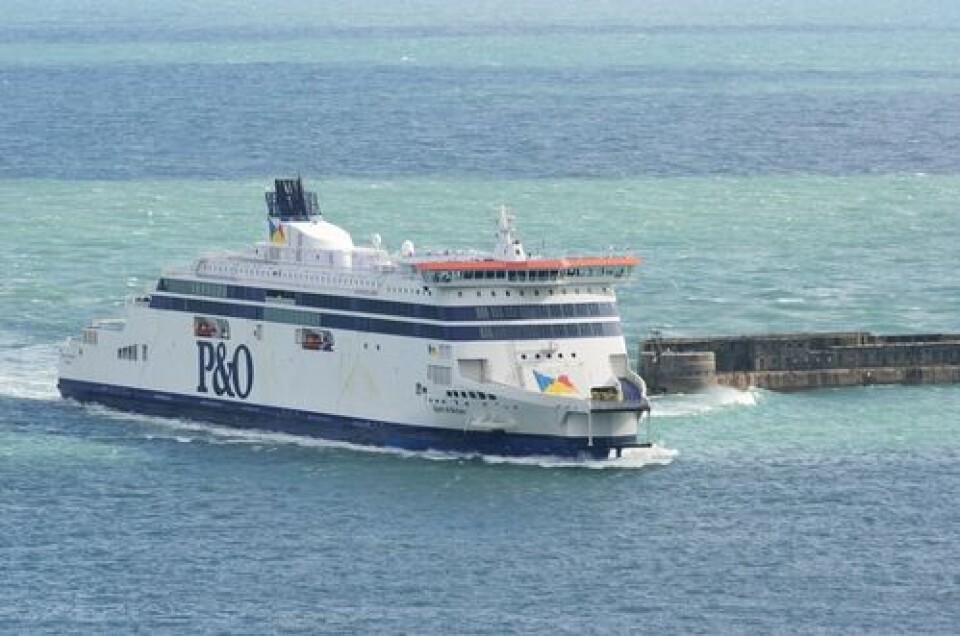-
Global recall of diabetes glucose sensors: French patients impacted
Up to three million distributed sensors provide dangerously low readings
-
French weekend weather forecast December 6 - 7: Highs of 20C as temperatures spike
Warm spell comes despite rain in west and north
-
Why does eastern France celebrate Saint-Nicolas on December 6?
Father Christmas may be known for his present delivery on December 24, but in the east of France, another bearded figure bearing gifts is celebrated much earlier in the month
France urged to follow as UK launches ferry fair pay law after P&O row
In France, unionists and a ferry firm want France to consider its own law or a bilateral deal; French officials say various options are under review

A law requiring at least the minimum wage for Channel ferry workers is progressing quickly through the UK parliament in the wake of the P&O sackings scandal – and unionists are calling on France to follow suit.
It comes as ferry firms report a better year – though not yet back to 2019 pre-Covid levels – with France-UK services and their frequency largely returned to normal.
Read more: Brittany Ferries report better year after 'ghastly' Covid period
Brittany Ferries reports an "extremely encouraging" year and is out of judicial supervision measures after suffering huge losses in the pandemic years.
The Seafarers’ Wages Bill requires the £9.50/hour wage to be paid to all staff with ‘close ties’ to the UK while in UK waters. It also has new rules on ‘hire and fire’ practices.
It is in the last stage with the House of Lords and will then be considered by MPs.
Brittany Ferries communications head Nigel Wonnacott said: “It is a very serious issue for us because it [the current situation] creates a playing field that is not level, aside from the fact that we, as a company, believe in supporting people and enriching regions.”
800 people sacked
Read more: P&O sacks 800 UK crew saying action was needed to remain viable
In March Dubai-owned P&O Ferries sacked 800 ferry staff without warning and replaced them with low-paid crew, some of whom were earning as little as £5.15/hour.
It avoided paying the UK minimum wage by employing the new workers from areas such as India on agency contracts out of Cyprus, where some of its ferries are registered.
Irish Ferries, which also ‘flags out’ its ships to Cyprus and started a Dover to Calais service in 2021 was, at that time, accused by a British union of being “aggressively low cost”, “anti-union” and using “the cheapest labour from around the world”.
Brittany Ferries and DFDS, which register Channel ships in France or, for some DFDS ships, the UK, have expressed concerns about the pressure flagging out puts on them.
Mr Wonnacott said: “We don’t treat our seafarers badly and don’t think other companies should treat theirs differently”.
‘Twice as expensive' for firms flying French flag
“There is also the competition element. It is at least twice as expensive for us to employ seafarers as it is for a company operating under a flag of convenience, and that’s a big hit when it comes to the profitability we now need in order to pay back the loans that were incurred during the crisis. We have to repay €117million to French banks.”
“I met the Transport Secretary in Portsmouth and she was very well aware of the issues and said we were on the right side of the argument.”
He added that the measures should ideally take account of working hours and conditions to avoid firms linking very long hours to minimum pay.
“There’s no point in wishy-washy wage legislation without ensuring high standards in other areas.”
He understood the UK law would be tied to a new code of conduct with a view to this.
Lobbying for France to follow UK steps
Mr Wonnacott said they are also “lobbying hard for France’s sea minister to come to the aid of the French shipping sector and replicate the clear action the British are taking”.
“We want to make sure they have the same appetite to ensure we don’t allow unfair competition that could – I’m not saying Brittany Ferries would do this – encourage other firms that do pay fairly to take similar drastic measures.”
He said he hoped the ministry would clarify this at this month’s Assises de l’économie de la mer (editor's note: The Sea Ministry has provided further comment on this since we spoke to Mr Wonnacott and since an initial version of this article was published in our November print edition, see below).
Read more: French union welcomes UK decision to force ferry firms to pay fairly
After protests over its decision to flag out in the early 2000s, Irish Ferries originally promised to pay Irish minimum wages on its ferries, which historically operated only from Ireland.
However, it declined to tell The Connexion if it is paying a UK or French minimum wage on its new UK-France services.
It also declined to comment on the UK’s law, as did P&O Ferries. DFDS communications head Nicole Seroff said:
“We welcome anything that improves conditions for our employees and supports a level playing field, and look forward to the legislation when it reaches its final form.”
France’s Feets-FO transport union lobbied on the ferry pay and conditions issue before this year’s election.
‘Astonished’ no sanctions against P&O
Its international issues spokesman Laurent Le Floch said: “We consider the UK’s role in this to be positive although we are at the same time astonished that there have not been any sanctions by the British government against P&O.”
UK union RMT said the bill did not go far enough, and called for amendments so it “promotes trade union-agreed pay and conditions, provides permanent employment, safe roster patterns and minimum protections for as many seafarers as possible”.
A UK Department for Transport spokeswoman said: “We reacted swiftly and decisively against P&O Ferries’ appalling treatment of its staff, setting out a nine-point plan to improve their pay and conditions.”
“Having brought forward minimum wage legislation, we are now working with our near European neighbours to further protect their welfare and pay.”
The UK has set goals including negotiating bilateral deals with neighbours on seafarer welfare and possible ‘minimum wage corridors’ in their respective waters.
However, the ministry declined to say what talks have been held with France. The French Sea Ministry was also unable to confirm talks have taken place.
Asked about any French bills or deal negotiations, Mr Le Floch said: “As things stand, France has no plans on this but when we next meet with the sea minister’s team we will raise the topic again.”
French government 'very worried' about situation in Channel
A spokeswoman for the French Sea Ministry has since told The Connexion that, on the contary, the government is "very worried" about the situation of firms plying the Channel under a French flag and "aware of the implications in social, economic and marine navigation safety terms, intends to stongly fight against these unfair competition practices and avert their appearance in French and EU waters".
She said the P&O sackings had shown the risks that exist and that, in line with President Macron's wishes expressed during France's EU presidency, the government considers fighting against 'social dumping' to be a priority. It wants to avoid any "reduction of social and salary conditions" of seafarers employed in EU waters, she said.
"It is in this spirit that the French government is studying the different legal tools that could be envisaged at national and European level to guarantee fair competition between companies whose ships fly the French flag and those regularly running ships under other flags in the Channel."
Related articles
What is my tax-free allowance when travelling to France via ferry
Reader’s tip on pet passport after cat issues boarding UK-France ferry
Zero particulate ferry begins sailing between Marseille and Corsica
























